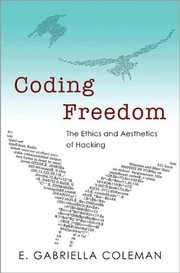Check nearby libraries
Buy this book

Who are computer hackers? What is free software? And what does the emergence of a community dedicated to the production of free and open source software--and to hacking as a technical, aesthetic, and moral project--reveal about the values of contemporary liberalism? Exploring the rise and political significance of the free and open source software (F/OSS) movement in the United States and Europe, Coding Freedom details the ethics behind hackers' devotion to F/OSS, the social codes that guide its production, and the political struggles through which hackers question the scope and direction of copyright and patent law. In telling the story of the F/OSS movement, the book unfolds a broader narrative involving computing, the politics of access, and intellectual property.
E. Gabriella Coleman tracks the ways in which hackers collaborate and examines passionate manifestos, hacker humor, free software project governance, and festive hacker conferences. Looking at the ways that hackers sustain their productive freedom, Coleman shows that these activists, driven by a commitment to their work, reformulate key ideals including free speech, transparency, and meritocracy, and refuse restrictive intellectual protections. Coleman demonstrates how hacking, so often marginalized or misunderstood, sheds light on the continuing relevance of liberalism in online collaboration.
Check nearby libraries
Buy this book

Previews available in: English
Subjects
hackers, free software, Debian, Intellectual freedom, Moral and ethical aspects, Computer programmers, Computer programming, Social aspects, Censorship, Electronic data processing personnel, Hacking, Open source software, Software piracy, Intellectual property, Copyright, Hacktivism, Computer hackersShowing 4 featured editions. View all 4 editions?
| Edition | Availability |
|---|---|
|
1
Coding Freedom: The Ethics and Aesthetics of Hacking: The Ethics and Aesthetics of Hacking
2012, Princeton University Press
Paperback
in English
0691144613 9780691144610
|
aaaa
Libraries near you:
WorldCat
|
|
2
Coding Freedom: The Ethics and Aesthetics of Hacking
2012, Princeton University Press
in English
0691144605 9780691144603
|
zzzz
Libraries near you:
WorldCat
|
|
3
Coding Freedom: The Ethics and Aesthetics of Hacking
2012, Princeton University Press
in English
1400845297 9781400845293
|
zzzz
Libraries near you:
WorldCat
|
|
4
Coding Freedom: The Ethics and Aesthetics of Hacking
2012, Princeton University Press
in English
1283856220 9781283856225
|
zzzz
Libraries near you:
WorldCat
|
Book Details
Table of Contents
Edition Notes
Classifications
The Physical Object
ID Numbers
Source records
Internet Archive item recordBetter World Books record
Library of Congress MARC record
Internet Archive item record
Promise Item
marc_columbia MARC record
marc_nuls MARC record
harvard_bibliographic_metadata record
Work Description
An anthropological study of Free Software hackers. A free .pdf version of this book is available on the author's website here
Community Reviews (0)
Feedback?| August 26, 2024 | Edited by MARC Bot | import existing book |
| March 8, 2023 | Edited by MARC Bot | import existing book |
| December 19, 2022 | Edited by MARC Bot | import existing book |
| August 3, 2020 | Edited by ImportBot | import existing book |
| December 1, 2012 | Created by bit | Added new book. |













